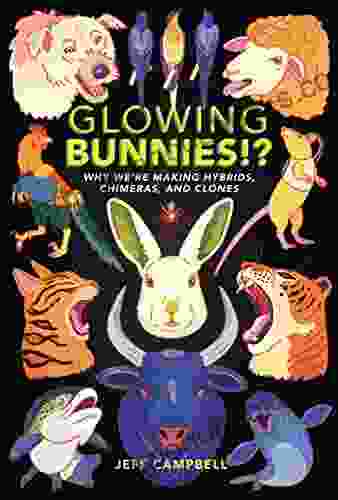Why We're Making Hybrids, Chimeras, and Clones: Exploring the New Frontiers of Biotechnology

In the realm of biotechnology, scientists are pushing the boundaries of what is possible, creating new life forms that challenge our understanding of nature. From combining different species to engineering genetic duplicates, these scientific advancements are opening up unprecedented possibilities for medical research, conservation efforts, and our understanding of life itself.
4 out of 5
| Language | : | English |
| Text-to-Speech | : | Enabled |
| Enhanced typesetting | : | Enabled |
| Word Wise | : | Enabled |
| File size | : | 27886 KB |
| Screen Reader | : | Supported |
| Print length | : | 243 pages |
Hybrids: Blending the Boundaries of Species
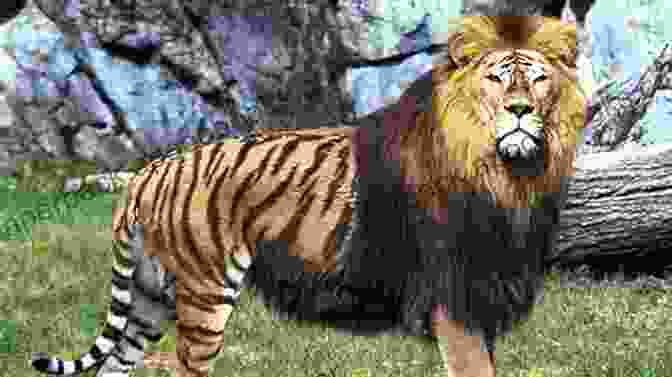
Hybrids are organisms created by crossing two different species, resulting in offspring that possess a combination of traits from both parents. Scientists have long created hybrids for agricultural purposes, such as mules (a hybrid of a donkey and a horse) and liger (a hybrid of a lion and a tiger). However, recent advancements in reproductive technologies have made it possible to create hybrids between species that were once considered incompatible.
Hybrids offer unique insights into the genetic diversity and evolutionary relationships between species. They can help us understand how different species evolved and how they might adapt to changing environmental conditions. Additionally, hybrids hold potential for medical research, as they may provide models for studying genetic diseases and developing new treatments.
Chimeras: Combining Different Cell Types

Chimeras are organisms that are composed of cells from two or more distinct individuals. They can be created by combining embryos, transplanting tissues, or even fusing cells. Chimeras have been used extensively in medical research to study a wide range of biological processes, including organ transplantation and immune function.
One of the most fascinating applications of chimera technology is the creation of "human-animal chimeras." By injecting human stem cells into animal embryos, scientists have created chimeras with human cells present in various organs and tissues. These chimeras have the potential to provide valuable models for studying human diseases and developing new treatments.
Clones: Replicating Genetic Identity
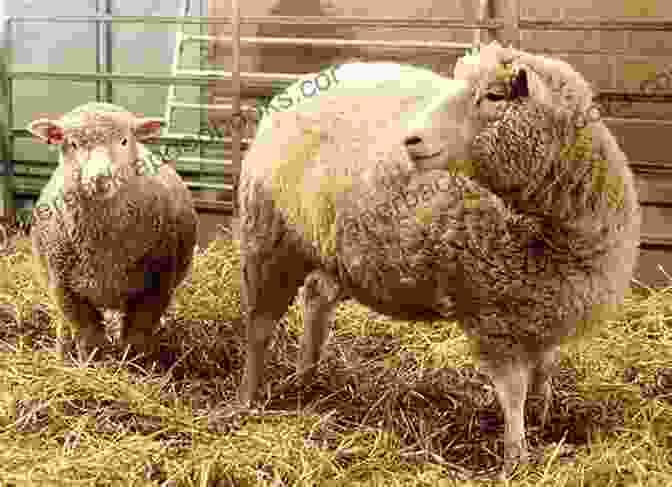
Clones are genetically identical copies of an existing organism. The most famous example of cloning is Dolly the sheep, who was created in 1996 by transferring the nucleus of an adult sheep cell into an egg that had its own nucleus removed. Dolly's birth marked a significant milestone in biotechnology, demonstrating the possibility of creating exact genetic replicas of animals.
Cloning has significant implications for medical research and conservation efforts. By cloning endangered species, scientists can help preserve genetic diversity and prevent extinction. Additionally, cloning could be used to create customized stem cell lines for regenerative medicine, offering new treatments for a wide range of diseases.
Ethical Considerations
While the creation of hybrids, chimeras, and clones holds immense scientific potential, it also raises important ethical considerations. One of the main concerns is the potential impact on biodiversity and the natural balance of ecosystems. If hybrids and chimeras are released into the wild, they could potentially disrupt natural populations and genetic diversity.
Another ethical concern is the welfare of the animals involved in these experiments. Creating hybrids, chimeras, and clones requires manipulating their genetic makeup and potentially altering their natural instincts and behaviors. Scientists have a responsibility to ensure that these animals are treated humanely and with respect.
Finally, there are concerns about the potential misuse of cloning technology. If cloning were to become widely available, it could raise issues of genetic engineering and human enhancement. It is essential to establish clear ethical guidelines and regulations to prevent the misuse of this powerful technology.
The creation of hybrids, chimeras, and clones represents a remarkable scientific achievement that is opening up new frontiers in biotechnology. These technologies have the potential to advance medical research, conservation efforts, and our understanding of life itself. However, it is imperative to proceed with caution and ethical consideration. As we continue to explore the boundaries of genetic engineering, we must remain mindful of the potential risks and benefits, ensuring that these technologies are used for the betterment of society and the preservation of our planet.
4 out of 5
| Language | : | English |
| Text-to-Speech | : | Enabled |
| Enhanced typesetting | : | Enabled |
| Word Wise | : | Enabled |
| File size | : | 27886 KB |
| Screen Reader | : | Supported |
| Print length | : | 243 pages |
Do you want to contribute by writing guest posts on this blog?
Please contact us and send us a resume of previous articles that you have written.
 Book
Book Novel
Novel Page
Page Chapter
Chapter Text
Text Story
Story Genre
Genre Reader
Reader Library
Library Paperback
Paperback E-book
E-book Magazine
Magazine Newspaper
Newspaper Paragraph
Paragraph Sentence
Sentence Bookmark
Bookmark Shelf
Shelf Glossary
Glossary Bibliography
Bibliography Foreword
Foreword Preface
Preface Synopsis
Synopsis Annotation
Annotation Footnote
Footnote Manuscript
Manuscript Scroll
Scroll Codex
Codex Tome
Tome Bestseller
Bestseller Classics
Classics Library card
Library card Narrative
Narrative Biography
Biography Autobiography
Autobiography Memoir
Memoir Reference
Reference Encyclopedia
Encyclopedia Joanne Hull
Joanne Hull John Cambridge
John Cambridge Rosa Lee Williams
Rosa Lee Williams Jeff Vandermeer
Jeff Vandermeer Jeanne Steig
Jeanne Steig Jeffrey Wainwright
Jeffrey Wainwright Matt Stone
Matt Stone Patrick Vinton Kirch
Patrick Vinton Kirch Kate Cone
Kate Cone Timothy J R Rains
Timothy J R Rains John R Hibbing
John R Hibbing Jeffrey James Byrne
Jeffrey James Byrne Jim Hasse
Jim Hasse Lee Young
Lee Young P G Van
P G Van Richard Surman
Richard Surman Jennifer Hu
Jennifer Hu Joanna Cooke
Joanna Cooke Joel Goldman
Joel Goldman Kerry Murphy
Kerry Murphy
Light bulbAdvertise smarter! Our strategic ad space ensures maximum exposure. Reserve your spot today!
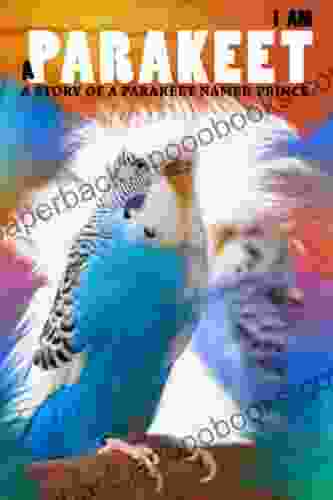
 Emmett MitchellDiscover the Delightful World of Parakeets with "Am Parakeet Parakeet for...
Emmett MitchellDiscover the Delightful World of Parakeets with "Am Parakeet Parakeet for...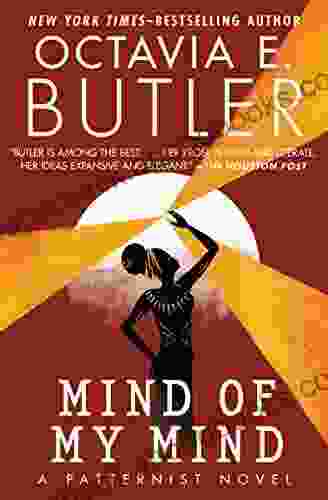
 Jamison CoxJourney into the Mind of a Patternist: Unraveling the Secrets of Mind of My...
Jamison CoxJourney into the Mind of a Patternist: Unraveling the Secrets of Mind of My... Kevin TurnerFollow ·5.8k
Kevin TurnerFollow ·5.8k Clinton ReedFollow ·18.7k
Clinton ReedFollow ·18.7k Henry HayesFollow ·14k
Henry HayesFollow ·14k Quentin PowellFollow ·4.4k
Quentin PowellFollow ·4.4k Joseph FosterFollow ·11k
Joseph FosterFollow ·11k Jay SimmonsFollow ·5.8k
Jay SimmonsFollow ·5.8k George R.R. MartinFollow ·6.3k
George R.R. MartinFollow ·6.3k Camden MitchellFollow ·8.2k
Camden MitchellFollow ·8.2k

 Preston Simmons
Preston SimmonsEmbark on a Literary Odyssey with "Walking on Water": A...
Prepare to be swept...

 Ernesto Sabato
Ernesto SabatoUnlocking Policy Analysis: Dive into the Intricacies of...
: The Realm of Policy...

 Forrest Reed
Forrest ReedThe Road to Grace Walk: A Journey of Spiritual Growth and...
In the tapestry of life, we...

 Evan Simmons
Evan SimmonsTip Neill and the Democratic Century: A Political Odyssey...
The Rise of a Political Giant In the...

 Mark Mitchell
Mark MitchellUnwrap the Magic: A Review of Christmas Memory by Richard...
As the cold winter months draw near, and...

 Percy Bysshe Shelley
Percy Bysshe ShelleyBeyond the Veil: Delve into the Realm of Spirit with In...
Unveiling the Mysteries of the Unseen...
4 out of 5
| Language | : | English |
| Text-to-Speech | : | Enabled |
| Enhanced typesetting | : | Enabled |
| Word Wise | : | Enabled |
| File size | : | 27886 KB |
| Screen Reader | : | Supported |
| Print length | : | 243 pages |


